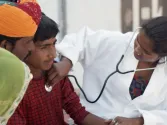Join the community
Most Read
1. SMART and NUS weaponize AI to give soft robots human-like reflexes 2. New A1Health-MediExpress partnership streamlines patient care across 21 hospitals 3. Advances in digital imaging, nanotech drive microscopy market to $11.4b by 2031 4. Health Bureau pushes workforce expansion in MCHK reform plan 5. Health sterotypes block early preventative actions amongst Asians: AIAResource Center
Events
Event News
Healthcare Asia Summit 2026 in Singapore to highlight digital transformation, emerging health ecosystems
Top leaders will discuss AI adoption in healthcare.

 Advertise
Advertise















Commentary
Relieve Pressure on Exhausted Healthcare Workers with Intelligent Automation
Relieve Pressure on Exhausted Healthcare Workers with Intelligent Automation
Why Healthcare Security Is Critical
The contract doctor conundrum: is there a long-term solution?
Can intelligent automation reduce errors in the healthcare sector?
Nextgen PPPs for Connected Healthcare in the Asia-Pacific
COVID-19 is spurring a digital health revolution - can private hospitals keep up?
Better healthcare decisions depend on better data collection
Preventing Surgical Site Infections: Does a one-size-fit-all model work?
Restoring care in Singapore's healthcare – with AI
The chatbot will see you now – virtual HCP engagement in the Asia Pacific
Cell therapy in the Asia Pacific — solution to the cancer challenge?
Talent War vs Talent Sharing: The Future of Life Sciences Teams in the Asia Pacific
Singapore Budget 2019 – Making healthcare more affordable and accessible
Protected data sharing and Life Sciences in the Asia Pacific: From treatment to prevention
Consumerisation of genetic testing: Perspectives from Asia
Unlocking health and care value: Diagnostics Industry in the Asia-Pacific
Universal healthcare adoption in Asia: Are Life Sciences companies late to the game?